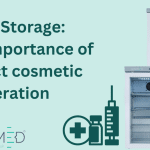
“Medical practitioners should consider holding a surplus stock of vaccines in the event Britain leaves the EU with no deal…”
Great Britain’s exit from the European Union will happen on 31st October 2019, unless another extension is granted between now and what is being dubbed “Brexit Day”.
Since the results of the referendum were first announced on 23rd June 2016, it has been a time of great uncertainty for businesses across all markets and sectors.
This is certainly the case for the healthcare industry, where medical practices and practitioners heavily rely on products and services sourced from European manufacturers and providers.
As Brexit Day fast approaches, it is vital that healthcare professionals ensure that they are prepared for every eventuality, to ensure they continue to offer a quality service to their patients; in particular those patients who are reliant on critical medicines.
This is also something that the Department for Health and Social Care (DHSC) is also aware of too.
What Has the Government Said?
In a letter to pharmaceutical companies, DHSC Secretary Matt Hancock asked suppliers to “increase their medicine stocks by at least six weeks, on top of their usual supply levels”.
He has also asked for these pharmaceutical companies to put plans in place for medicines and vaccines with a short shelf-life to be transported by air to healthcare practitioners up and down the country. This is to ensure that, in the event of a “no deal” Brexit, the UK healthcare industry have a contingency plan in place, where there are enough medicines and vaccines to operate effectively in the immediate aftermath.
How Will a “No Deal” Brexit Impact the Healthcare Industry?
Of course, this has a knock-on effect for both healthcare manufacturers and practitioners, as they will need to correctly store all of these additional medicines and vaccines.
Anyone working in the medical and healthcare sector will understand the importance of storing medications and vaccines correctly, and having these remedies remain in the cold-chain from the point of manufacture through to administration.
When transporting medical stock, temperature-controlled boxes are used to maintain these conditions, and upon arrival at their destination, medicines are then transferred into a dedicated medical fridge.
Although this sounds reasonably simple, if pharmaceutical companies and healthcare practitioners are required to stock more vaccines than usually expected, maintaining the cold-chain conditions can be made extremely difficult.
Especially if pharmacists and GP practitioners are not knowledgeable on how to store their medicines correctly, there is a risk that they can become spoiled, unusable, and ultimately can make this surplus of stock redundant.
Below, we will cover the steps you should take to ensure that you are prepared for storing additional vaccines, as part of plans to safeguard against a “no deal” Brexit.
1) Ensure Your Stock Levels are Correct
As Brexit Day moves ever closer, you should monitor vaccine stock levels and consider increasing levels to ensure you have the required medicines in the event of a no deal outcome.
The DHSC recommends that manufactures “increase their stock levels by six weeks so practitioners should consider a similar increase themselves…”.
Although you will want to be prepared, also be mindful of the shelf life of the medicines/vaccines you are stocking too. If a Brexit deal is agreed, your surplus stock may not be urgently required, and will be used at a similar rate to normal.
To ensure you do not generate a substantial amount of waste, make sure you are using vaccines in accordance with their expiry dates. Stock should be checked on a regular basis, and all medications nearing their expiry date should be placed at the front of your medical fridge, so it can be used before those with a longer shelf-life.
2) Make Sure Vaccines are Correctly Stored
As well as abiding by vaccine expiration dates, your medical fridge also needs to be organised in a certain way to avoid the contents falling out of the cold-chain.
When stocking your medical fridges, make sure they are never more than 75% full, and a 1cm gap should always be left between vaccines.
If your fridge becomes over-stocked and not spaced correctly, the airflow inside can be impacted and not cool the contents equally. This can leave some vaccine vials at risk of falling out of the cold-chain.
If you find that you need to invest in another medical fridge to store your surplus stock of medicines, a small medical fridge will most likely suffice.
3) Safeguard and Monitor Surplus Vaccines
It goes without saying that surplus medicines should be stored and monitored with the same care and attention as the vaccines that you currently stock and use.
Whilst these vaccines are being stocked as a contingency plan in the event of “no deal” Brexit, they still need to be monitored to make sure they are safe to administer to patients. This means that there cannot be any disruption to their cold-chain conditions and storage environment.
To ensure this, make sure to monitor your medical fridge temperatures, log expiration dates and regularly clean fridges to ensure vaccines are stored in optimum conditions.
Get in Touch!
The final outcome of Brexit remains unknown, but medical practitioners can and should take steps to ensure that they have a surplus of vaccines and medicines to cover their needs in the event of no deal.
If you would like to speak to us and discuss how we can help you prepare for the impact of a “no deal” Brexit, or just discuss our range of medical equipment, please contact us here.
Featured Products
-

Solid Door Small Refrigerator CMS29
£575.99 £479.99 excl. VAT Add to cart -

Glass Door Small Refrigerator CMG29
£623.99 £519.99 excl. VAT Add to cart -

Solid Door Small Refrigerator CMS59
£719.99 £599.99 excl. VAT Add to cart -

Glass Door Small Refrigerator CMG59
£779.99 £649.99 excl. VAT Add to cart -

Solid Door Medium Refrigerator CMS125
£1,175.99 £979.99 excl. VAT Add to cart -

Glass Door Medium Refrigerator CMG125
£1,295.99 £1,079.99 excl. VAT Add to cart -

Glass Door Large Refrigerator CMG300
£1,799.99 £1,499.99 excl. VAT Add to cart -

Solid Door Large Refrigerator CMS400
£2,159.99 £1,799.99 excl. VAT Add to cart





